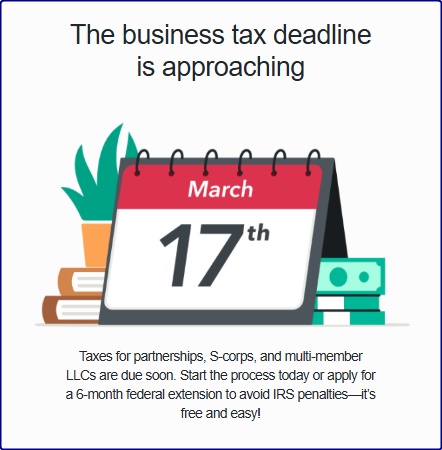
❗️❗️❗️
March 17th is the deadline for business tax or this year, is your books ready? We still have very few slots until March 10 available for your bookkeeping and tax preparation need. DM me for inquiries

❗️❗️❗️
March 17th is the deadline for business tax or this year, is your books ready? We still have very few slots until March 10 available for your bookkeeping and tax preparation need. DM me for inquiries
Business taxpayers can file electronically any Form 1099 series information returns for free with the IRS Information Returns Intake System. The IRIS Taxpayer Portal is available to any business of any size. It’s secure, reduces the need for paper forms and requires no special software.
With IRIS, business taxpayers can:
Get started
Taxpayers will need a IRIS Transmitter Control Code to access the IRIS Taxpayer Portal. This 5-digit code provides an extra layer of security for filing and can only be use on this portal.
First time users can use Publication 5717, IRIS Taxpayer Portal User Guide, for detailed instructions about access and features.
E-filing required for 10 or more returns
If you have 10 or more information returns, you must file them electronically. This includes Forms W-2, e-filed with the Social Security Administration.
Find details on the final e-file regulations.
Source: IRS
Back taxes is a term for taxes that were not completely paid when due. Typically, these are taxes that are owed from a previous year. Causes for back taxes include failure to pay taxes by the deadline, failure to correctly report one’s income, or neglecting to file a tax return altogether.
Most of this happen because of lack or incomplete recording in the books that it is hard for the tax accountant to get the information it needs to complete the filing of return.
What are the implications of this?
If back taxes are owed, the taxpayer’s debt will continue to increase with the inclusion of interest and tax penalties. Late payment penalties include 1/2 of 1% for each month the taxes remain due past the due date. If the taxpayer never filed taxes, there is also a significant late filing penalty.
You will also risk losing your refund and other benefits if you don’t file your return. If you are due a refund for withholding or estimated taxes, you must file your return to claim it within 3 years of the return due date. The same rule applies to a right to claim tax credits such as the Earned Income Credit.
What do you need to do?
First, consult with your tax accountant what needs to be done.
Second, look for someone to complete your books.
(Hint: We are an expert when it comes to accounting and bookkeeping.)
Lastly, act now. The longer you delay filing, the larger your interest and penalties will be!
File when ready, don’t wait until October 17 to file a 2021 tax return.
For people who requested an IRS extension to file, the October 17, 2022, deadline may seem far away, but it’s coming up fast.
Taxpayers who haven’t filed, whether they requested an extension or not, should file a complete and accurate return as soon as possible.
For people who have all their paperwork in hand, filing sooner and filing electronically could help them avoid possible processing delays later.
And for those who have not done their books for 2021, we can help!
Dear Clients and Partners,
Just want to share with you some tax-related matters for your information, this is about 1099-NEC and 1099-MISC.
What are these forms?
Form 1099-MISC (Miscellaneous Information) or Form 1099-NEC (Nonemployee Compensation) to:
-simply put these are contractors, project-based or self-employed individuals
-examples are rent paid for the year and fees to attorneys
Note that these are for US-based contractors and payees only, if you are outsourcing from anywhere in the world other than the US then you don’t have to file or send out these forms.
Let us know if you have paid these kinds of payees, so that we can generate reports for you that you can use for your business or send to your accountant.
Deadlines for submission to IRS:
For your US-based employees, you need to fill out Form W-2 and submit to SSA, IRS and employees on or before January 31.
Hope this information will be helpful. Thank you!
All the best,
Melchie

There are several important dates taxpayers should keep in mind for this year’s filing season: